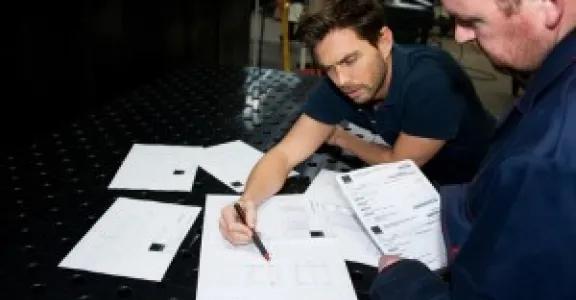The Dutch metallurgical SME Bregil recently went for a different approach on the production floor, according to the QRM principles. The result is now an empty floor, a quiet workshop and higher turnover, thanks to shorter lead times and higher productivity.
Bregil is active in the processing, welding, powder coating, sublimation and assembly of metal sheets and tubes. The company produces shop fittings, displays, furniture frames, machine parts and tools.
A few years ago, the company started with LEAN, which proved to be a great help, but in the long run was not the way that would really help the company, because of the large variation in order size, type of products and materials. LEAN focuses on the elimination of waste and the reduction of costs, but cannot provide sufficient support for the enormous diversity and short delivery times that are expected from Bregil. QRM does offer the necessary support as this strategy only focuses on (lead) time. It made the organisation more efficient and many other things improved, including price, quality, quantity of waste and stock management. In addition, QRM also pays attention to the involvement of employees, as they are the driving force behind this method. They were given more responsibilities and the opportunity to organise their own work.
Pilot projects
The first steps towards QRM were taken in 2015, when a QRM board was set up, consisting of members of the management, two heads of department and a consultant: this is a place where ideas and criticisms can be expressed.
The first pilot projects were started on this basis: first of all a unit for the production of furniture. Part of the factory is designed to make furniture products that have to meet certain requirements, including production at least once every six weeks and some identical operations. Seven employees work in this unit and have access to a welding station, an assembly station, various presses and other machinery. Together with the sawing and bending departments, they succeeded in reducing the turnaround time for furniture products from 10-12 days to two days.
A second pilot project consisted of a round schedule, which started with one of the first operations in the production, in the sawing department. They are now only told what needs to be sawn for the next day. No more bundled orders for the sake of efficiency, everything revolves around turnaround time, with much less chaos as a result.
Smart planning, flexible work
In the meantime, three different units have been set up, each with their own colour (red, green and blue) and own planning board. Above the signs are pictures of the team members, indicating the colour of their unit.
The principles of QRM are successfully put into practice in the units: the employees received cross-training to allow members to temporary replace others in other teams. The occupancy rate is limited to 80 percent of the capacity. This allows short and stable lead times of on average about five days on the shop floor. Because the lead times are stable, it is sufficient to determine via the planning board when something can be started up in the unit. The amount of work that is released every day on the shop floor remains limited.
Complex planning solutions can be avoided if the actual production system is designed properly. The entire system is very visual and transparent, making it quick and easy for everyone to understand the state of affairs and to move resources around easily. The system is very low-cost, because you are not dependent on expensive software. Instead, Bregil chooses to invest in the development of its people. For example, a group of employees is coached on a weekly basis.
In this way, the Dutch company is able to present astonishing figures, including a 40 percent increase in productivity, while the lead time could be reduced by 80 percent.
Read more about QRM here.
Does your company receive an increasing number of personalised demands from customers and requests for shorter lead times? If so, the QRM method may be an interesting tool for you!
Sirris regularly organises info sessions about QRM, but also intensive training to teach you how to implement QRM in your organisation. The dates for the next sessions are listed in our agenda.
(Source picture : https://qrminstitute.org)





